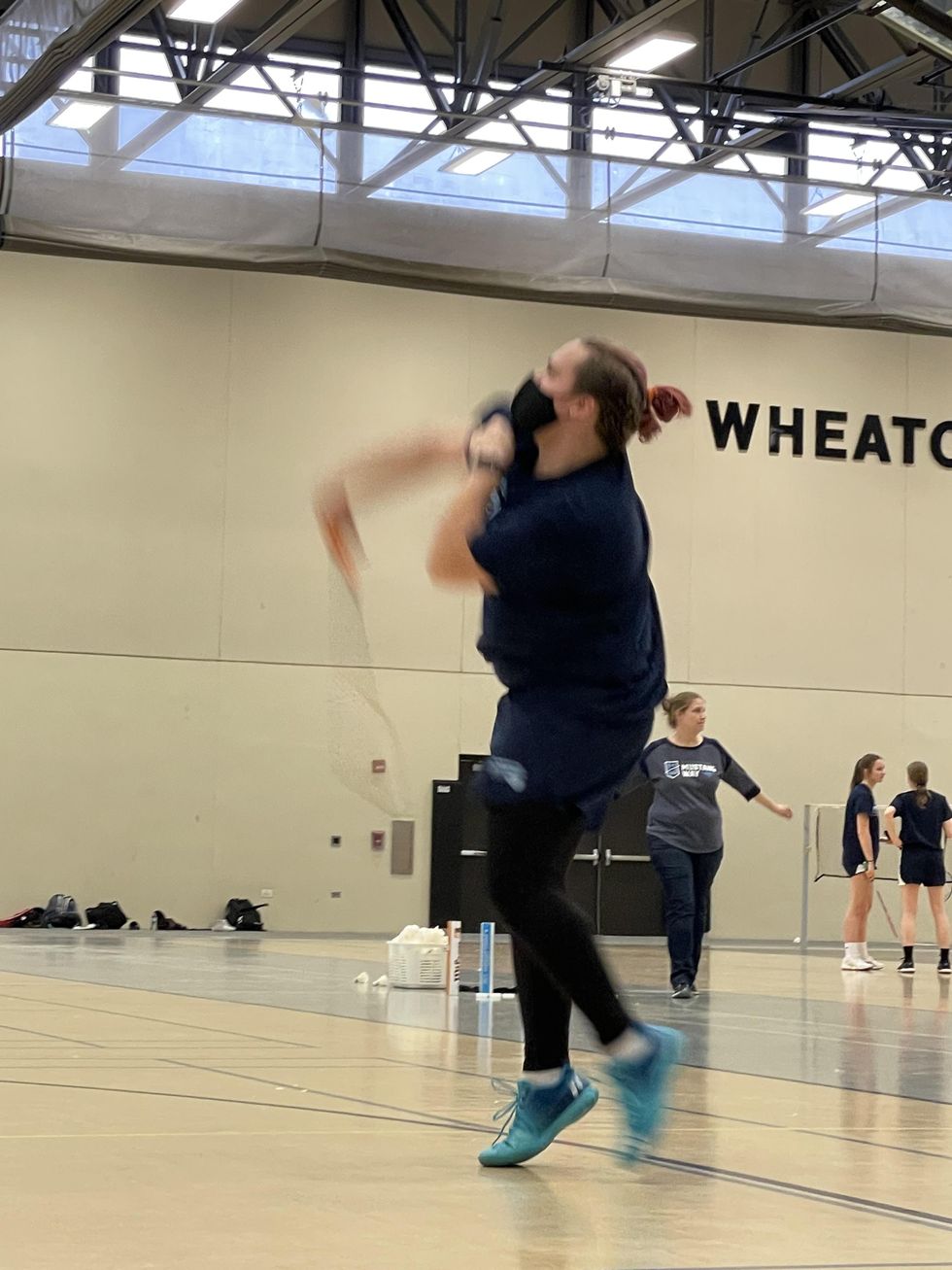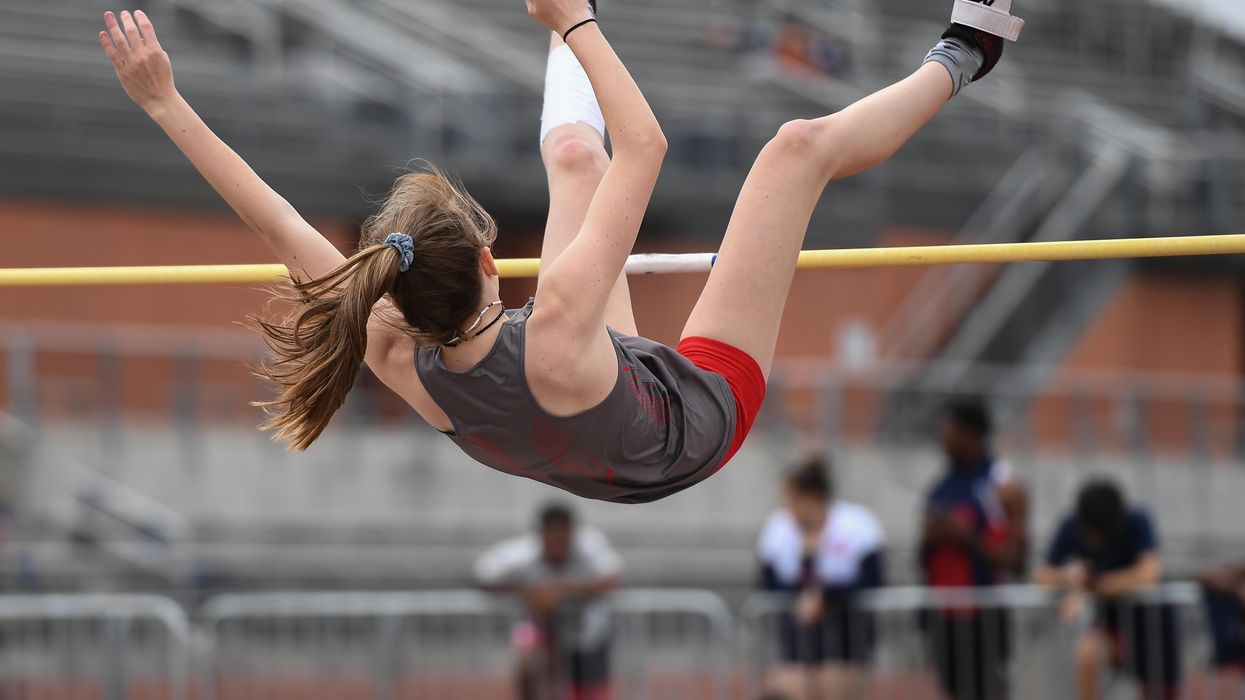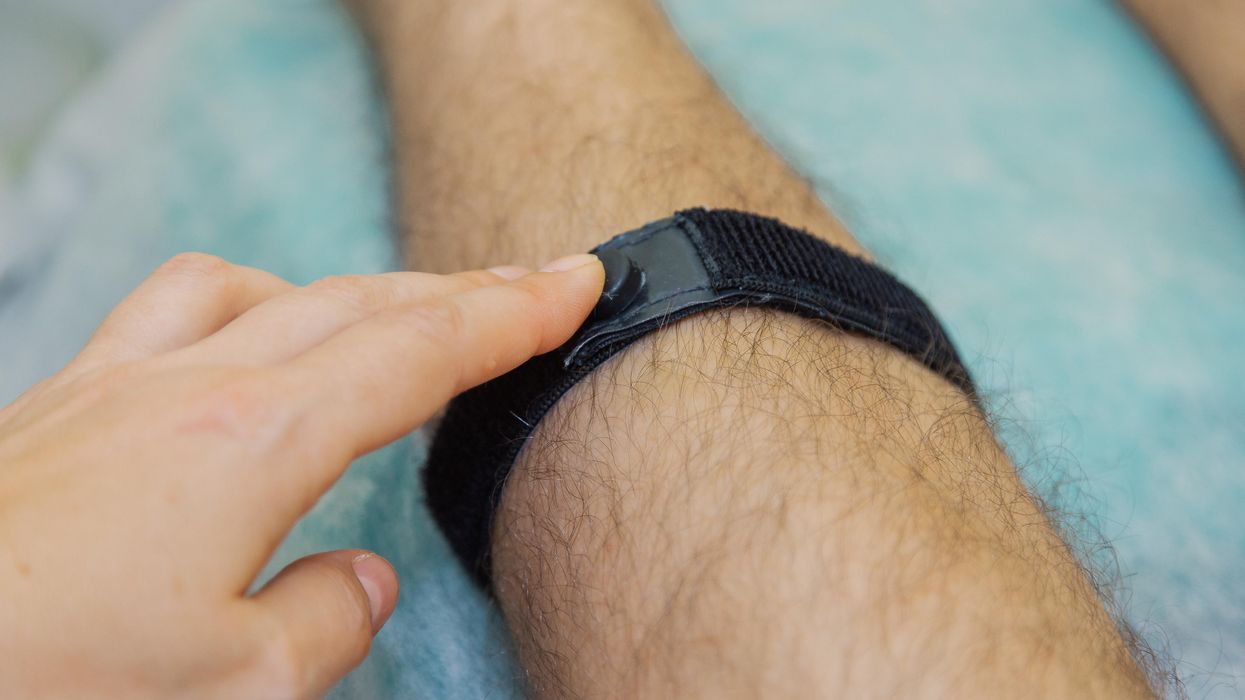The Troubling Reason I Obsessively Researched My Pregnancy

A pregnant woman in her third trimester.
At the end of my second trimester of pregnancy, I answered a call from an unknown number.
To be pregnant is to exist on a never-ending receiving line of advice, whether we want it or not.
"I know your due date is approaching," said a stranger at the other end of the line, completely freaking me out. She identified herself as being from Natera, a company that my doctor had used for genetic testing I had consented to months ago.
"Excuse me?" I said.
"Have you considered cord-blood banking?" she said.
"No, I'm not doing that," I said. I had read enough about cord-blood banking, the process of saving stem cell-containing blood from your baby's umbilical cord, to understand that my family was in the vast majority of those that would with extremely high likelihood derive no medical benefit from it. Of course, in the societally sanctioned spending spree that accompanies new parenthood, plenty of companies are happy to charge anyone hundreds if not thousands of dollars plus annual storage fees to collect and manage your cord blood.
"Why not? Have you considered all the bene—"
"I'm not doing it and I don't want to explain my decision," I said before hanging up. I would later learn I neglected to check a miniscule box on my testing consent forms at the doctor to opt out of solicitations. Still, I was angry that I was being telemarketed unnecessary and costly medical services by someone who had been trained to immediately call my judgment into question. I was annoyed that my doctor's office would allow such intrusions at all. When I asked my OB about it at my next visit, she told me there's no way Natera would have gotten my information from them. Apparently even she didn't realize what was on those forms.
The incident with Natera did nothing to heighten my trust of the medical establishment during my pregnancy. I was hardly alone. Almost every mom I knew had expressed a similar sentiment.
"I don't trust doctors," read the text of a loved one when I told her I would probably get an epidural after my doctor recommended getting one because, she said, it can help relax the pelvic muscles during labor. But this friend, a highly educated woman who had had done her research and had two unmedicated births, believed firmly otherwise. "Look it up," she said. Thus commenced more of the furious Googling I found myself doing multiple times a day since deciding I wanted to become pregnant.
To be pregnant is to exist on a never-ending receiving line of advice, whether we want it or not. Information presents to us from Google's never-out-of-reach search bar, friends and family eager to use our pregnancies as an excuse to recall their own, and the doctor's office, where the wisdom of medical professionals neatly comingles with brochures and free samples from myriad companies that would really, really like our business as new moms. Separating the "good" advice from the rest is a Herculean task that many pregnant women manage only with vigorous fact-finding missions of their own.
The medical community in America is poorly equipped to help women navigate the enormous pressures that come with birth and transitioning to motherhood.
Doing my research during pregnancy felt like a defense against the scary unknowns, overabundance of opinions, and disturbing marketing schemes that come with entering parenthood. The medical community in America is poorly equipped to help women navigate the enormous emotional and societal pressures that come with birth and transitioning to motherhood. Too much of what pregnant women experience at the doctor has to do with dated ideas about our care, mandated by tradition or a fear of being sued rather than medical necessity. These practices, like weigh-ins at every appointment or medically unnecessary C-sections (which are estimated to account, horrifically, for almost 50 percent of all C-sections performed in the U.S.), only heighten anxiety.
Meanwhile, things that might alleviate stress – like having thorough discussions about the kinds of interventions we might be asked to accept at the hospital during labor and delivery – are left to outside educators and doulas that insurance plans typically don't cover. The net effect isn't better health outcomes for mom and baby, but rather a normalized sense of distrust many American women feel toward their OBGYNs, and the burden of going to every appointment and the delivery room on the defensive. Instead of being wed to dated medical practices and tangled in America's new motherhood industrial complex, shouldn't our doctors, of all people, be our biggest advocates?
As soon as I found out I was pregnant, I devoured Expecting Better, by Emily Oster, an economist who embarked on her own fact-finding mission during her first pregnancy, predicated on the belief that the advice OBGYNs have been giving pregnant women for decades is out of date and unnecessarily restrictive. The book includes controversial stances, like that having small amounts of alcohol while pregnant is OK. (More recent research has called this view into question.) Oster writes that for the vast majority of pregnant women, it's perfectly fine to lie on your back, do sit-ups, and eat Brie — all things I was relieved to learn I wouldn't have to give up for nine months, despite the traditional advice, which my doctor also gave to me.
Oster recommends hiring a doula, based both on research and personal experience. It's a worthwhile investment for those who can afford it: according to one study, 20.4 percent of laboring women with doulas had C-sections compared with 34.2 percent of women without them. A doula can do many things for a pregnant client, including helping her write a birth plan, massaging her back in labor, and cheering her on, which is especially useful for women who plan to labor without pain medication. Use of doulas is on the rise; according to DONA International, the world's largest and oldest doula association, the number of doulas who have been certified to date is over 12,000, up from 2,000 in 2002.
But the most significant role a doula plays is that of patient advocate in the hospital. This is a profound commentary on the way the medical establishment handles childbirth, a medical event that 86 percent of women aged 40 to 44 had gone through as of 2016. Recognizing the maternal mortality crisis in the U.S., where women are far more likely to die as a result of childbirth than anywhere else in the developed world and black women are three times more likely to die in childbirth than white women, a few states now allow Medicaid to cover doulas. Can you imagine feeling the need to hire an independent non-medical care provider to help you run interference with your doctors and nurses for something like an appendectomy?
I wouldn't have been aware of all the imminent interventions during my labor if my doula hadn't told me about them. Things happen fast in the hospital and doctors and nurses may rush patients to consent before proceeding with things like breaking their water or hooking them up to an IV of Pitocin. Only because my husband and I had spent six hours in birth class — a suggestion by my doula — did I realize that I was empowered to say "no" to such procedures.
Expecting more trustworthy advice to come from my doctor than books or Google or even a doula hardly seems unreasonable.
Of course, we all feel immense pressure to become good parents, and questioning conventional medical wisdom is a natural response to that pressure. "Looking around at the world and saying, who am I as a parent? What is important to me? Who are the wise people? What do I think wisdom is? What is a good decision? If you're a certain type of introspective person, if you're really asking those questions, that's going to include like taking a second look at things that doctors, for example, say," says Koyuki Smith, a doula and birth educator.
Expecting more trustworthy advice to come from my doctor than books or Google or even a doula hardly seems unreasonable. Yet my doctor's office seemed more concerned with checking off a list of boxes rather than providing me with personalized care that might have relieved my understandable anxiety about my first birth. When I still hadn't gone into labor around the time of my due date, my doctor encouraged me to be induced because my baby appeared to be large. I declined but scheduled an induction to "hold my spot" around the 42-week mark.
When I asked what medication would be used for an induction if I had one and she said Cytotec, I told her I had read that drug could cause serious complications, but she dismissed my concerns after I told her they stemmed from a book I read on natural childbirth. The FDA's page on Cytotec isn't exactly reassuring.
The nurse who took me in triage after I went into labor a week past my due date practically scolded me for waiting to go into labor naturally instead of opting for induction sooner. My doula told her while I was struggling to speak through labor pains to get off my case about it. I hadn't even become a mom and I was already doing so many things "wrong." Because I had done my own reading, I felt confident that my choices weren't harming my baby or me.
Becoming a mom would be less daunting if the medical community found a way to help women navigate the pressures of motherhood instead of adding to them. "Our culture at large doesn't support women enough in the complicated emotions that are a part of this process," said Alexandra Saks, a reproductive psychologist and author of What No One Tells You: A Guide to Your Emotions From Pregnancy to Motherhood. "I hope that every practitioner that works with women around reproductive health prioritizes her emotions around her experience."
For many of us, that will mean doctors who help us understand the pros and cons of conventional advice, don't use their offices as marketing channels, and don't pressure women into medically unnecessary inductions. Moms should also receive more attention after delivery both in the hospital and after they get home; a single, quick postpartum visit at six weeks is not an adequate way to care for women recovering from the trauma of childbirth, nor is it an adequate way to ensure women are emotionally supported during the transition. While several people interrogated me about my mental health at the hospital and my doctor's office just before and after birth, if I had been concerned about postpartum depression, I can't imagine feeling comfortable enough in those moments to tell strangers filling out obligatory worksheets.
It also means figuring out how to talk to patients who are prone to Googling their pregnancies with gusto every single day. It would be impossible for many women to shun independent research during pregnancy altogether. But it would also be nice if our doctors didn't add to our impulse to do it.
Debates over transgender athletes rage on, with new state bans and rules for Olympians, NCAA sports
Some argue that transgender females should be banned from competing with women in sports, while others think such bans are unfair, as the NCAA and other organizations try to keep up with research on how testosterone affects performance.
Ashley O’Connor, who was biologically male at birth but identifies as female, decided to compete in badminton as a girl during her senior year of high school in Downers Grove, Illinois. There was no team for boys, and a female friend and badminton player “practically bullied me into joining” the girls’ team. O’Connor, who is 18 and taking hormone replacement therapy for her gender transition, recalled that “it was easily one of the best decisions I have ever made.”
She believes there are many reasons why it’s important for transgender people to have the option of playing sports on the team of their choice. “It provides a sense of community,” said O’Connor, now a first-year student concentrating in psychology at the College of DuPage in Glen Ellyn, Illinois.
“It’s a great way to get a workout, which is good for physical and mental health,” she added. She also enjoyed the opportunity to be competitive, learn about her strengths and weaknesses, and just be normal. “Trans people have friends and trans people want to play sports with their friends, especially in adolescence,” she said.
However, in 18 states, many of which are politically conservative, laws prohibit transgender students from participating in sports consistent with their gender identity, according to the Movement Advancement Project, an independent, nonprofit think tank based in Boulder, Colo., that focuses on the rights of LGBTQ people. The first ban was passed in Idaho in 2020, although federal district judges have halted this legislation and a similar law in West Virginia from taking effect.
Proponents of the bans caution that transgender females would have an unfair biological advantage in competitive school sports with other girls or women as a result of being born as stronger males, potentially usurping the athletic accomplishments of other athletes.
“The future of women’s sports is at risk, and the equal rights of female athletes is being infringed,” said Penny Nance, CEO and president of Concerned Women for America, a legislative action committee in D.C. that seeks to impact culture to promote religious values.
“As the tidal wave of gender activism consumes sports from the Olympics on down, a backlash is being felt as parents are furious about the disregard for their daughters who have worked very hard to achieve success as athletes,” Nance added. “Former athletes, whose records are being shattered, are demanding answers.”
Meanwhile, opponents of the bans contend that they bar transgender athletes from playing sports with friends and learning the value of teamwork and other life lessons. These laws target transgender girls most often in kindergarten through high school but sometimes in college as well. Many local schools and state athletic associations already have their own guidelines “to both protect transgender people and ensure a level playing field for all athletes,” according to the Movement Advancement Project’s website. But statewide bans take precedence over these policies.
"It’s easy to sympathize on some level with arguments on both sides, and it’s likely going to be impossible to make everyone happy,” said Liz Joy, a past president of the American College of Sports Medicine.
In January, the National Collegiate Athletic Association (NCAA), based in Indianapolis, tried to sort out the controversy by implementing a new policy. It requires transgender students participating in female sports to prove that they’ve been taking treatments to suppress testosterone for at least one year before competition, as well as demonstrating that their testosterone level is sufficiently low, depending on the sport, through a blood test.
Then, in August, the NCAA clarified that these athletes also must take another blood test six months after their season has started that shows their testosterone levels aren’t too high. Additional guidelines will take effect next August.
Even with these requirements, “there is no plan that is going to be considered equitable and fair to all,” said Bradley Anawalt, an endocrinologist at the University of Washington School of Medicine. Biologically, he noted, there is still some evidence that a transgender female who initiates hormone therapy with estrogen and drops her testosterone to very low levels may have some advantage over other females, based on characteristics such as hand and foot size, height and perhaps strength.
Liz Joy, a past president of the American College of Sports Medicine, agrees that allowing transgender athletes to compete on teams of their self-identifying gender poses challenges. “It’s easy to sympathize on some level with arguments on both sides, and it’s likely going to be impossible to make everyone happy,” said Joy, a physician and senior medical director of wellness and nutrition at Intermountain Healthcare in Salt Lake City, Utah. While advocating for inclusion, she added that “sport was incredibly important in my life. I just want everyone to be able to benefit from it.”
One solution may be to allow transgender youth to play sports in a way that aligns with their gender identity until a certain age and before an elite level. “There are minimal or no potential financial stakes for most youth sports before age 13 or 14, and you do not have a lot of separation in athlete performance between most boys and girls until about age 13,” said Anwalt, who was a reviewer of the Endocrine Society’s national guidelines on transgender care.
Myron Genel, a professor emeritus and former chief of pediatric endocrinology at Yale School of Medicine, said it’s difficult to argue that height gives transgender females an edge because in some sports tall women already dominate over their shorter counterparts.
He added that the decision to allow transgender females to compete with other girls or women could hinge on when athletes began taking testosterone blockers. “If the process of conversion from male to female has been undertaken in the early stages of puberty, from my perspective, they have very little unique advantage,” said Genel, who advised the International Olympic Committee (IOC), based in Switzerland, on testosterone limits for transgender athletes.
Because young athletes’ bodies are still developing, “the differences in natural abilities are so massive that they would overwhelm any advantage a transgender athlete might have,” said Thomas H. Murray, president emeritus of The Hastings Center, a pioneering bioethics research institute in Garrison, New York, and author of the book “Good Sport,” which focuses on the ethics and values in the Olympics and other competitions.
“There’s no good reason to limit the participation of transgender athletes in the sports where male athletes don’t have an advantage over women,” such as sailing, archery and shooting events, Murray said. “The burden of proof rests on those who want to restrict participation by transgender athletes. They must show that in this sport, at this level of competition, transgender athletes have a conspicuous advantage.”
Last year, the IOC issued a new framework emphasizing that the Olympic rules related to transgender participation should be specific to each sport. “This is an evolving topic and there has been—as it will continue to be—new research coming out and new developments informing our approach,” and there’s currently no consensus on how testosterone affects performance across all sports, an IOC spokesperson told Leaps.org.
Many of the new laws prohibiting transgender people from competing in sports consistent with their gender identity specifically apply to transgender females. Yet, some experts say the issue also affects transgender males, nonbinary and intersex athletes.
“There has been quite a bit of attention paid to transgender females and their participation in biological female sports and almost minimal focus on transgender male competition in male sports or in any sports,” said Katherine Drabiak, associate professor of public health law and medical ethics at University of South Florida in Tampa. In fact, “transgender men, because they were born female, would be at a disadvantage of having less lean body mass, less strength and less muscular area as a general category compared to a biological male.”
While discussing transgender students’ participation in sports, it’s important to call attention to the toll that anti-transgender legislation can take on these young people’s well-being, said Jonah DeChants, a research scientist at The Trevor Project, a suicide prevention and mental health organization for LGBTQ youth. Recent polling found that 85 percent of transgender and nonbinary youth said that debates around anti-transgender laws had a negative impact on their mental health.
“The reality is simple: Most transgender girls want to play sports for the same reasons as any student—to benefit their health, to have fun, and to build connection with friends,” DeChants said. According to a new peer-reviewed qualitative study by researchers at The Trevor Project, many trans girls who participated in sports experienced harassment and stigma based on their gender identity, which can contribute to poor mental health outcomes and suicide risk.

In addition to badminton, O'Connor played other sports such as volleyball, and she plans to become an assistant coach or manager of her old high school's badminton team.
Ashley O'Connor
However, DeChants added, research also shows that young people who reported living in an accepting community, had access to LGBTQ-affirming spaces, or had social support from family and friends reported significantly lower rates of attempting suicide in the past year. “We urge coaches, educators and school administrators to seek LGBTQ-cultural competency training, implement zero tolerance policies for anti-trans bullying, and create safe, affirming environments for all transgender students on and off the field,” DeChants said.
O’Connor said her experiences on the athletic scene have been mostly positive. The politics of her community lean somewhat liberal, and she thinks it’s probably more supportive than some other areas of the country, though she noted the local library has received threats for hosting LGBTQ events. In addition to badminton, she also played baseball, lacrosse, volleyball, basketball and hockey. In the spring, she plans to become an assistant coach or manager for the girls’ badminton team at her old high school.
“When I played badminton, I never got any direct backlash from any coaches, competitors or teammates,” she said. “I had a few other teammates that identified as trans or nonbinary, [and] nearly all of the people I ever interacted with were super pleasant and treated me like any other normal person.” She added that transgender athletes “have aspirations. We have wants and needs. We have dreams. And at the end of the day, we just want to live our lives and be happy like everyone else.”
In this week's Friday Five, research on a "smart" bandage for wounds, a breakthrough in fighting inflammation, the pros and cons of a new drug for Alzheimer's, benefits of the Mediterranean diet with a twist, and we've learned to recycle a plastic that was un-recyclable.
The Friday Five covers five stories in research that you may have missed this week. There are plenty of controversies and troubling ethical issues in science – and we get into many of them in our online magazine – but this news roundup focuses on scientific creativity and progress to give you a therapeutic dose of inspiration headed into the weekend.
Listen on Apple | Listen on Spotify | Listen on Stitcher | Listen on Amazon | Listen on Google
Here are the promising studies covered in this week's Friday Five:
- Research on a "smart" bandage for wounds
- A breakthrough in fighting inflammation
- The pros and cons of a new drug for Alzheimer's
- Benefits of the Mediterranean diet - with a twist
- How to recycle a plastic that was un-recyclable

